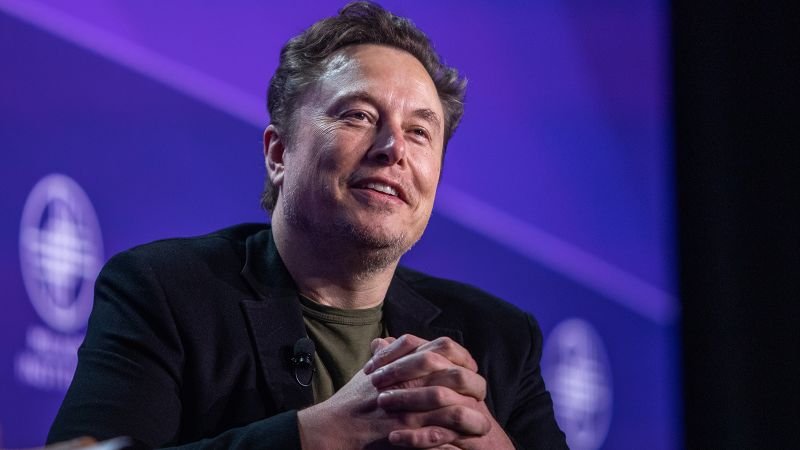
New York
CNN
—
These should be tough days for Tesla. Sales are down. It’s making less money on every car it does manage to sell. Competitors are eating into its market share, especially internationally. The end of various federal EV policies could cost the company billions.
And then there’s the CEO. Elon Musk made the company what it is, turning it from a humble startup into a financial juggernaut. But now there’s near-constant controversy swirling around him as he upends the US government, inserts himself into international politics, plays video games and posts on his social media site, X, drawing his attention away from Tesla in what he himself describes as a “pivotal year” for the company.
But you wouldn’t know that by the value of Tesla shares (TSLA), which still dwarfs any other automaker’s market value.
Musk took up most of a recent investor call promising imminent, major advances on self-driving cars, robotaxis and humanoid robots and promising that next year would be “epic,” rather than addressing the company’s fundamentals. Investors sent the stock up 4% in the following days anyway, even though Musk himself has admitted that he has a track record of not delivering on promises.
“There is a path where Tesla is worth more than the next top five companies combined,” he predicted. “It’s, like, a difficult path, but it is an achievable path.”
Some analysts questioned the gains in Tesla shares.
“The move higher in Tesla shares bore no relation whatsoever to the company’s financial performance in the quarter just completed or to its outlook for growth in the coming year,” wrote JPMorgan auto analyst Ryan Brinkman in a note to clients. “Tesla shares continue to strike us as having become completely divorced from the fundamentals.”
But some investors remain Tesla bulls.
“The bulls are laser focused on the AI and autotonomous vehicles story,” said Wedbush Securities analyst Dan Ives, who counts himself as one of those bulls, with a $550 12-month price target that would be 45% above Wednesday’s closing price. Ives said beyond the promise of autonomous vehicles, Tesla’s plans to sell humanoid robots to the public as soon as 2026 would be “a game changer.”
What will make Tesla so valuable, in Musk’s view, is that owners of its autonomous vehicles will soon be able to rent their cars for rides – a sort of robot-driven Uber – thereby making money when the cars would otherwise be parked. Musk argues that will change the basic economics of car ownership.
And Musk predicted even greater sales for the company’s planned “Optimus” humanoid robots, which he said could bring in more than $10 trillion a year.
“It’s really bananas,” he said.
A history of broken promises
But Musk has had a history of ambitious promises and badly missed targets.
In 2016 he said the company’s so-called Full Self Driving feature, or FSD, would allow owners to summon their cars to come to them, without anyone on board, from all the way across the country by the end of 2017. And with each successive year, he kept saying true autonomous driving, with no human driver intervention, was just a year or so away. In 2019 he predicted Tesla’s robotaxi service would be available by 2020.
The reality is that Tesla’s FSD is under investigation by the National Transportation Safety Board for a series of accidents, and it still requires a person to sit behind the steering wheel ready to take control of the cars.
Yet in October 2024, when unveiling a prototype of his driverless Cybercab, which doesn’t even have an accelerator pedal, brake pedal or steering wheel, he promised “unsupervised (driving) possibly by the end of this year.” He added: “I tend to be a little optimistic with time frames.”
Unsupervised driving still hasn’t been launched. And in last week’s investors call, Musk revealed that existing Teslas will need a “painful and difficult” hardware update to ever be able to be truly self driving.
Then there are the promised regulatory changes.
The Trump administration has also said it plans to end a $7,500 tax credit for electric vehicles, including Tesla, this year. While that could hurt legacy automakers’ EV sales the most, that would still make Teslas more expensive relative to gasoline-powered cars – just as growth in US demand for EVs is slowing.
In addition, Tesla gets billions from the sale of regulatory credits to automakers that still sell primarily gasoline-powered cars. The Trump administration is vowing to roll back tougher emissions rules that give rise to those regulatory credits in the first place.
Will Musk give Tesla the attention it needs?
Musk has always been distracted by his other businesses, like SpaceX, The Boring Company, Neuralink, and his social media platform, X, and is now even more distracted by his role reshaping the federal government.
During past Tesla challenges, like ramping up new vehicle production, Musk was literally living and sleeping at the plants and working around the clock. That won’t be the case at Tesla this time.
Even with the EV tax credit still in place, Tesla just reported its first drop in annual sales in 2024 as it faces increased competition from other automaker’s increased EV offerings. It is close to losing its title of the world’s largest maker of EVs to Chinese automaker BYD. And Tesla sales could be hurt by political blowback.
For example, the number of vehicles Tesla sold in Germany in January fell 59% compared to a year ago, according to the German Federal Motor Transport Authority. Just as Musk has been a key supporter of President Donald Trump, he has become a high profile supporter of the far-right Alternative for Germany (AfD) party.
Shares of Tesla fell 4% in trading Thursday after the German sales drop was disclosed. But shares are still up 50% since the November 5 US election, as investors bet Tesla will benefit from Musk’s new role as Trump’s so-called “first buddy.”


